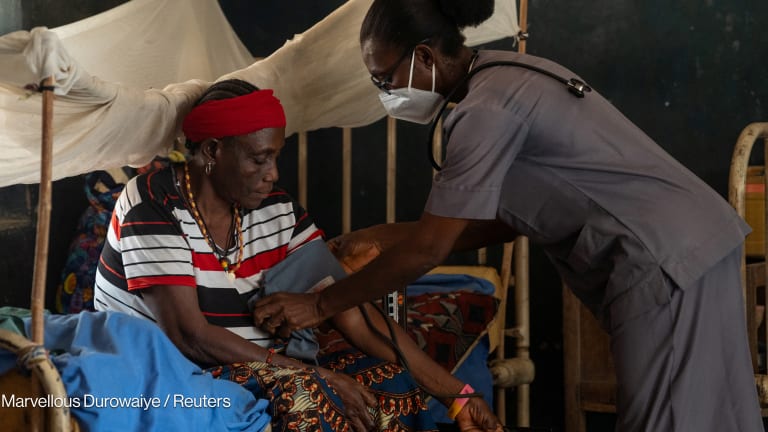
Since taking office, U.S. President Donald Trump has made Twitter akin to his press office — he uses it to make official statements on issues, to fire government officials, and share his opinions on his enemy of the day — or week. As a result, the media, public officials, and even Cher, have taken their engagement with President Trump and his administration to the modern “public square.”
But what happens when dangerous rhetoric about climate change, humanitarian crises, or family planning gets spread by the most powerful office in the country? Is it business as usual for the organizations working to make progress on these challenges?
I was curious to see how the public debates of climate change, reproductive rights, and refugee crises have impacted the communicators at organizations working on these issues. Several communications officials I spoke with asked to remain anonymous, but here’s what I learned.
Groups coming together
For development communicators who rely on government donors and work on partisan issues, administration cycles are part of the ecosystem. “Elections happen and you need to adjust to new folks in town and their way of doing things and their priorities,” said an official at a large international nonprofit.
“We cannot permit ourselves to avoid calling unacceptable behavior unacceptable.”
— Eric Schwartz, president, Refugees InternationalFor some development work, it can mean simply referencing issues by different names for a term, or two — but some issues spur more fundamental changes for aid delivery. The “global gag rule,” for example, is a policy that has been expanded under the Trump administration and has long been a political football. Over the past three decades, it’s been put into place by Republican administrations and rescinded under each Democratic administration.
After the 2016 election, one communications official at an international company wondered what the new administration meant for international development.
The official reached out to counterparts in the aid sector to talk it out. What started as a discussion among peers would grow into a safe space for development communicators: “It evolved into this ad hoc group of just [development] communicators who felt like we needed to come together,” the official said.
Now, the group meets monthly to discuss various communications topics, including one unexpected result: serving as a place to workshop internal communications messaging for staff at their various organizations when unexpected development news does come from Trump’s Twitter feed.
Relying on an informed Congress
Even with the existing rhetoric on myriad polarizing development issues, such as humanitarian response and aid to Latin America, professionals in the development space have a critical ally in Congress, according to Joel Charny, executive director at the Norwegian Refugee Council. “Congress is absolutely critical as a check on the administration but also as a place where we can still find bipartisan support for the kind of values and programs that we stand for,” he said.
One area where Congress’ support remains critical is the ongoing foreign aid budget debate. Trump threatened to cut the aid budget several times during the government shutdown earlier this year, and the current budget proposal remains in question for 2020.
But despite White House support, Trump allies, such as Sen. Lindsay Graham have spoken out against proposed foreign aid cuts citing its role in “soft power.” This, Charny argued, illustrates that Congress continues to show unprecedented support for key issues, such as international humanitarian response.
Charny added that he has not observed a marked difference, however, on development organizations’ approach to the messaging challenge overall.
“The organizations that are courageous are still courageous. The organizations that historically are not courageous … are not,” he concluded.
Rhys Gerholdt, senior communications manager at the World Resources Institute, added that not getting distracted by the headwinds is key for communicators during this time. “What’s harder [about our work now] is that you have someone who has the bully pulpit saying these very strong statements about climate change that are often untrue,” he said. Still, Gerholdt said that WRI is sticking to what it always has: starting with facts.
Speaking on humanitarian comments made by Trump, Eric Schwartz, president at Refugees International, added that the aid sector has an obligation to not permit the normalization of this type of speech.
“We cannot permit ourselves to avoid calling unacceptable behavior unacceptable,” he said. For Refugees International, this has meant being “forthright and, in some cases where appropriate, rather sharp” in organizational statements about administration policies and practices.
What’s at stake?
While the shift in development communications in the Trump era seems more tactical than revolutionary, a second communications official raised a concern about what’s at stake when the administration’s policies with multilateral institutions — typically the place where business gets done and parties come together to forge compacts and agreements — change drastically.
“[If] the U.S. is stepping away from that space and undermining those forums for business to get done, then that’s alarming,” the official said. “If those places are no longer forums where business can get done, where does that take you?”
The United States can often set trends within the aid sector. But if the trends are moving toward the explicit rejection of humanitarian principles, climate change denial, and the restriction of reproductive rights for women around the world — there is much more at stake.








